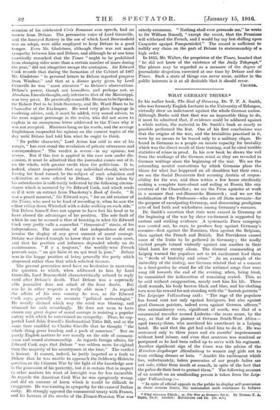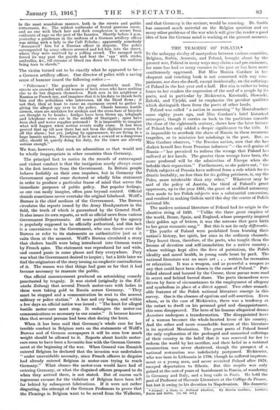WHAT GERMANY THINKS.*
IN his earlier book, The Soul of Germany, Dr. T. F. A. Smith, who was formerly English Lecturer in the University of Erlangen, virtually drew an indictment against the whole German nation. Although Burke said that that was an impossible thing to do, it must be admitted that, if evidence could be adduced against a whole nation, the material in Dr. Smith's book as nearly as possible performed the feat. One of his first conclusions was that the origins of the war, and the brutalities practised in it, were by no means to be traced only to a military clique. He found in Germans as a people an innate capacity for brutality which was the direct result of their training, and he cited terrible statistics of crime in proof. In his new book he draws the veil from the workings of the German mind as they are revealed in German writings since the beginning of the war. We see the astounding mental contortions by which Germans place the blame for what has happened on all shoulders but their own ; we see the Social Democrats first accusing Austria of respon- sibility for the war, and then within a few hours obediently making a complete turn-about and railing at Russia like any creature of the Chancellor ; we see the Press agencies at work in a manner that out-Bismarcks Bismarck; and we see the mobilization of the Professors—who are all State servants—for the purpose of exculpating Germany, and discovering prodigious acts of bad faith and wickedness among Germany's enemies.
Dr. Smith's assertion that riots were caused in Germany at the beginning of the war by sheer excitement is supported by curious and striking evidence. A systematic Press campaign was carried out, he says, to produce fury against Germany's enemies—first against the Russians, then against the Belgians, then against the French and British. But Providence caused some of the fruits to be gathered in Germany ; the madly excited people turned violently against one another in their blind hunt for enemy aliens. The General commanding at Leipzig warned the populace not to let excitement lead them to "deeds of brutality and crime." As an example of the imbecility of the rioting, one German related that at a concert in a beer-garden he stood for all the national songs that were sung till towards the end of the evening, when, being tired, he committed the indiscretion of remaining seated. -This, as he said without exaggeration, nearly cost him his life. Three skull wounds, his body beaten black and blue, and his clothing torn were his reward for not standing with the "hurrah-patriots." The Leipziger Volkszeitung said : "The rage of the populace has found vent not only against foreigners, but also against good German patriots, indeed even against German officers." One extraordinary case, significant of much, was that of a commercial traveller named Liideritz—the same name, by the way, as that of the pioneer of German South-West Africa— aged twenty-three, who murdered his sweetheart in a Leipzig hotel. He said that the girl had asked him to do it. He was sentenced only to three years and six months' imprisonment without hard labour, and even that sentence was remitted or postponed as he had been called up to serve with his regiment. Another significant sign of the times was the advice of the Munchen-Augsburger Abendzeitung to women and girls not to wear striking dresses or hats. "Amidst the excitement which has, unfortunately, taken possession of our people ladies are not safe, either from insult or assault, in spite of the fact that the police do their best to protect them." The following account of an assault on an unoffending person is taken from the Leip- ziger Volkazeitung "In spite of official appeals to the public to display self-possession in these serious times, the nationalist mob continues to behave • What Germany Thinks : or, The War as Germans See it. By Thomas F. A,. Smith, Ph.D. London Hutchinson and Co. [ds. net.] in the most scandalous manner, both in the streets and public restaurants, &c. The wildest outbreaks of brutal passions occur, and no one with black hair and dark complexion is secure from outbursts of rage on the part of the fanatics. Shortly before 5 p.m. yesterday a gentleman in the uniform of a German artillery officer was sitting with a lady in the Café Folsehe ; apparently somebody ' denounced ' him for a Russian officer in disguise. The police accompanied by army officers arrested and led him into the street, where they were received by a yelling crowd. The enraged mob forced its way past the guards and beat the ' spy ' with sticks, umbrellas, &c., till streams of blood ran down his face, his uniform being torn to shreds."
The victim turned out to be exactly what he appeared to be— a German artillery officer. One director of police with a saving sense of humour issued the following notice ;—
" Policemen ! The populace is going absolutely mad. The streets are crowded with old women of both sexes who have nothing else to do but disgrace themselves. Each sees in his neighbour a Russian or French spy, and imagines that it is his duty to thrash both him and the policeman who intervenes, till the blood flows ; if not that, then at least to cause an enormous crowd to gather in giving the alleged spy over to the police. Clouds become hostile airmen, stars are mistaken for airships and the cross.bars of bicycles are thought to be bombs ; bridges have been blown up, telegraph and telephone wires cut in the middle of Stuttgart ; spies have been shot and water supplies poisoned! It is impossible to imagine what will happen when serious events really come. It has been proved that up till now there has not been the slightest reason for all this alarm ; but yet, judging by appearances, we are living in a huge lunatic asylum. Everyone, if he is not a coward or a dangerous idler, should be, quietly doing his duty, for the times are already serious enough.'
We fear, however, that such an admonition as that would not be wholly inappropriate in other countries than Germany.
The principal fact to notice in the records of extravagant and violent conduct is that the instigation nearly always came in the first instance from the Government. In Britain people behave foolishly on their own impulses, but in Germany the Government spread some doctored or wholly false statement in order to produce a particular frame of mind that serves the immediate purposes of public policy. But popular feelings, as one can easily imagine, often pass beyond control. Official denials sometimes never overtake the original falsehood. Wolff's Bureau is the chief medium of the Government. The Bureau circulates the reports issued by the Army Headquarters in the field, the truth of which is guaranteed by the General Staff.
It also issues its own reports, as well as official news from various Government Departments. All news published by the agency is popularly supposed to be officially authorized, and this fact
is a convenience to the Government, who can throw over the Bureau or refer to its statements as authoritative just as it suits them at the moment. Wolff's Bureau circulated a story that cholera bacilli were being introduced into German water by French spies. The statement was reproduced far and wide, and caused panic in some places and fury everywhere. Fury was what the Government desired to inspire ; but a little later we find the originators of the story issuing an emphatic contradiction of it. The reason was that things had gone so far that it had become necessary to reassure the public.
One official announcement produced an astonishing comedy punctuated by tragedy. It was stated (originally in the Hot- nische Zeitttng) that several French motor-cars with ladies in them were taking gold to Russia across Germany. "They must be stopped and a communication be sent to the nearest military or police station." A hue and cry began, and within a few days an official notice was issued: "The hunt for alleged
hostile motor-cars must stop. It endangers the motor-car communications so necessary to our armies." It became known then that several persons had been shot during the hunt.
When it has been said that Germany's whole case for her terrible conduct in Belgium rests on the statements of Wolff's Bureau and of German newspapers it will be seen how much weight should be allowed to it. Reports about hostile motor-
cars seem to have been a favourite line with the German Govern-
ment at the beginning of the war. When General von Rminich entered Belgium he declared that the invasion was undertaken "under unavoidable necessity, since French officers in disguise had already entered Belgium in motor-cars trying to reach Germany." What chance the motor-cars would have had of entering Germany, or what the disguised officers proposed to do when they arrived there, is not stated. But of course such ingenuous excuses for the violation of Belgium have been left far behind by subsequent fabrications. If it were not rather disgusting, the attempt of the German Professors to prove that the Flemings in Belgium want to be saved from the Walloons, and that Germany is the saviour, would be amusing. Dr. Smith has amassed much material on the Belgian question and on many other problems of the war which will give the reader a good idea of how the German mind is working at the present moment.



































 Previous page
Previous page